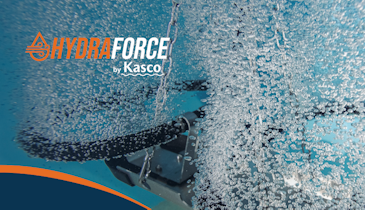Interested in Dewatering/Biosolids?
Get Dewatering/Biosolids articles, news and videos right in your inbox! Sign up now.
Dewatering/Biosolids + Get AlertsIt has been demonstrated that increased levels of technical-grade Mg2+ improve bioflocculation, according to the divalent cation bridging theory. This theory states that negatively charged sites on exocellular biopolymers are bridged by divalent cations such as Ca2+ and Ma2+ (Higgins and Novak, 1997). This bridging helps to stabilize the microbe-biopolymer floc matrix [see illustrations below]. The ratio of the monovalent (Na+, NH4+, K+) to divalent cations (M/D) can be used as an indicator of potential sludge settling and dewatering problems. When this ratio is above approximately 2, which can occur when using caustic soda for pH control, settling and dewatering problems occur.
The settling problems can be overcome by reducing the M/D ratio, which:
- Increases the divalent cation concentrations
- Decreases the monovalent cation concentrations
- Does both by replacing monovalent cation with divalent alternatives
Higgins et al. (2004) demonstrated that replacing sodium hydroxide with technical grade magnesium hydroxide at an industrial wastewater treatment plant significantly improved the settling and dewatering properties of the floc. While using NaOH, the M/D ratio was 48, which decreased to 0.1 when using technical grade Mg(OH)2.
During treatment with technical grade magnesium hydroxide, the sludge volume index, effluent total suspended solids, and effluent chemical oxygen demand were all reduced by up to 63 percent. Alum and polymer dose used for clarification were also reduced by approximately 50 percent and 60 percent, respectively. The dewatering properties of the activated sludge also improved, which resulted in an increase in filter cake solids. These combined improvements led to significant annual savings in sludge handling and disposal, by switching from caustic soda to technical grade magnesium hydroxide.
Technical-grade magnesium hydroxide improves settling and dewatering, which leads to significant savings in sludge handling and disposal. Thioguard is a safe, environmentally friendly alternative for the wastewater treatment industry, which not only delivers significant savings, but also results in multiple benefits downstream and within your plant and collection system. Thiouard is a leading national supplier of technical grade magnesium hydroxide, owned, mined and produced in the U.S. Find out how the new Thioguard Omega-S program can help you take advantage of technical-grade magnesium’s benefits while addressing struvite and nutrient management needs. Call 800/227-4287 today for details.






